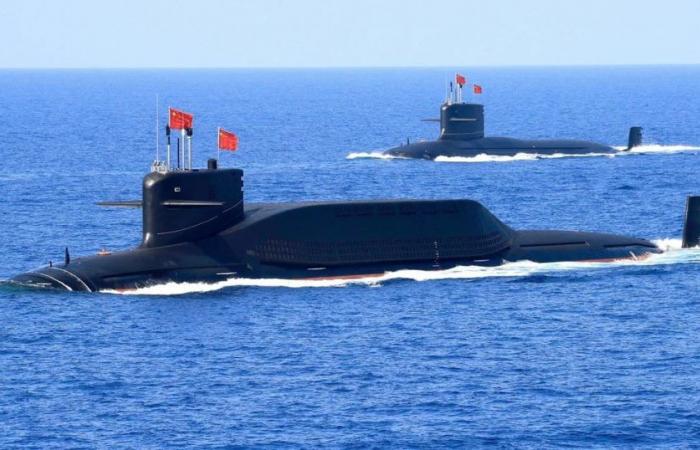
USA and China resumed semi-official nuclear weapons talks in March for the first time in five years, and representatives of Beijing told their American counterparts that they would not resort to atomic threats on Taiwanaccording to two American delegates who attended.
Chinese representatives offered assurances after their American interlocutors expressed concern that China could use, or threaten to use, nuclear weapons if it faced defeat in a conflict over Taiwan. Beijing considers the democratically governed island as its territory, a claim rejected by the Taipei government.
“They told the American side that they were absolutely convinced that they can prevail in a conventional fight for Taiwan without using nuclear weapons.”said academic David Santoro, the American organizer of the Track Two talks, the details of which are being reported. by Reuters for the first time.
Participants in Track Two talks are generally former officials and academics who can speak with authority about their government’s position, even if they are not directly involved in setting it. Negotiations between governments are known as Track One.
Washington was represented by about half a dozen delegates, including former officials and academics, at the two-day discussions, which took place in a Shanghai hotel conference room.
Beijing sent a delegation of academics and analysts, including several former People’s Liberation Army officers.
A State Department spokesperson said in response to questions from Reuters that Track Two talks could be “beneficial.” The department did not participate in the March meeting although it was aware of it, the spokesperson said.
Such discussions cannot replace formal negotiations “which require participants to speak with authority on topics that are often highly compartmentalized within (Chinese) government circles”said the spokesperson.
Members of the Chinese delegation and Beijing’s Defense Ministry did not respond to requests for comment.
Informal discussions between the nuclear-armed powers took place with the United States and China at odds over major economic and geopolitical issues, and leaders in Washington and Beijing accused each other of negotiating in bad faith.
The two countries briefly resumed Track One talks on nuclear weapons in November, but those negotiations have since stalled, and a senior U.S. official publicly expressed frustration with China’s ability to respond.
The Pentagon, which estimates that Beijing’s nuclear arsenal increased more than 20% between 2021 and 2023, said in October that China “would also consider nuclear use to restore deterrence in the event of a conventional military defeat in Taiwan” threaten the PCC government.
China has never renounced the use of force to bring Taiwan under its control and over the past four years has intensified military activity around the island.
The Track Two talks are part of a two-decade dialogue on nuclear weapons and posture that stalled after the Trump administration withdrew funding in 2019.
After the pandemic COVID-19, Semi-official discussions on broader security and energy issues resumed, but only the Shanghai meeting addressed nuclear weapons and posture in detail.
Santoro, who heads the Hawaii-based Pacific Forum think tank, described the “frustrations” on both sides during the latest discussions, but said the two delegations saw reasons to continue talking. More discussions are being planned for 2025, he said.
The nuclear policy analyst William Alberquefrom the group of experts Henry Stimson Centerwho was not involved in the March discussions, said the Track Two negotiations were useful at a time of frosty relations between the United States and China.
“It is important to continue talking to China without any expectations,” he said, when it comes to nuclear weapons.
The US Department of Defense estimated last year that Beijing has 500 operational nuclear warheads and will likely deploy more than 1,000 by 2030.
That compares with 1,770 and 1,710 operational warheads deployed by the United States and Russia, respectively. The Pentagon said that by 2030, much of Beijing’s weapons will likely be kept at higher readiness levels.
Since 2020, China has also modernized its arsenal, starting production of its next-generation ballistic missile submarine, testing hypersonic glide vehicle warheads, and conducting regular nuclear-armed maritime patrols.
Land, air and sea weapons give China the “nuclear triad,” a hallmark of a major nuclear power.
A key point the U.S. side wanted to discuss, according to Santoro, was whether China still maintained its no-first-use and minimum deterrence policies, which date back to the creation of its first nuclear bomb in the early 1960s.
Minimum deterrence refers to having enough atomic weapons to deter adversaries.
China is also one of two nuclear powers (the other being India) that has pledged not to engage in a nuclear exchange. Chinese military analysts have speculated that the no-first-use policy is conditional – and that nuclear weapons could be used against Taiwan’s allies – but it remains Beijing’s stated position.
Santoro said Chinese delegates told U.S. representatives that Beijing maintained these policies and that “‘we are not interested in achieving nuclear parity with you, much less superiority.'”
“’Nothing has changed, everything is the same as always, you are exaggerating’”Santoro said in summarizing Beijing’s position.
His description of the discussions was corroborated by fellow American delegate Lyle Morris, a security scholar at the Asia Society Policy Institute.
A report on the discussions is being prepared for the U.S. government but will not be made public, Santoro said.
Top U.S. arms control official Bonnie Jenkins told Congress in May that China had not responded to nuclear weapons risk reduction proposals that Washington raised during formal talks last year.
China has yet to agree to more government-to-government meetings.
Beijing’s “refusal to substantially engage” in discussions about its nuclear buildup raises questions about its “already ambiguous stated ‘no first use’ policy and its nuclear doctrine more generally,” the State Department spokesperson told Reuters.
China’s Track Two delegation did not discuss specific details about Beijing’s modernization effort, they said. Santoro and Morris.
Alberque, of the Henry Stimson Center, said China relied heavily on “risk and opacity” to mitigate US nuclear superiority and that it was not “imperative” for Beijing to hold constructive discussions.
China’s expanded arsenal – which includes anti-ship cruise missiles, bombers, intercontinental ballistic missiles and submarines – exceeded the needs of a state with minimal deterrence and a no-first-use policy, Alberque said.
Chinese talking points revolved around the “survivability” of Beijing’s nuclear weapons if it suffered a first strike, Morris said.
U.S. delegates said the Chinese described their efforts as a deterrence-based modernization program to address developments such as improved U.S. missile defenses, improved surveillance capabilities and strengthened alliances.
The United States, Britain and Australia last year signed an agreement to share nuclear submarine technology and develop a new class of vessels, while Washington is now working with Seoul to coordinate responses to a possible atomic attack.
Washington’s policy on nuclear weapons includes the possibility of using them if deterrence fails, although the Pentagon says it would only consider it in extreme circumstances. He did not provide details.
A Chinese delegate “pointed to studies that said Chinese nuclear weapons were still vulnerable to American attacks; their second strike capability was not enough,” Morris said.
(With information from Reuters)





